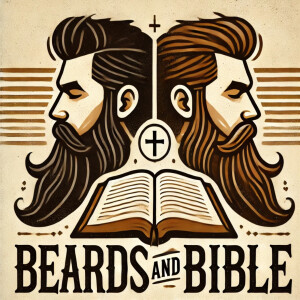Episodes

Wednesday Oct 13, 2021
Wednesday Oct 13, 2021
The word “sing” appears in the Bible over 400 times, and at least 50 of those are commands for followers of Jesus to sing. In Colossians 3:16, believers are commanded to, “sing to God with gratitude from the heart” and to sing to each other, teaching and admonishing through “psalms, hymns, and spiritual songs”. It’s clear from the Bible that God desires for His people to sing- both to Him and to each other. But what happens when that experience of connecting with God and other believers through music gets commodified and turned into a product to be bought and sold?
Total sales from the Christian music industry are more than a half billion US dollars annually. Christian/Gospel music is considered one of the fastest growing areas in recorded music history, with more than 1,400 radio stations and 80 million listeners. Even mainstream brands such as Pepsi MidAmerica, Cracker Barrel, Allstate, NASCAR and McDonald’s, among others, have aligned with Gospel/Christian artists, releases and festivals and events to promote their brands.
It’s clear that there’s money to be made in Christian music and entertainment. But at what cost to the Christian message? And what about the artists, producers, and writers that help create that music? Are they all, truly “Christian”- or are they simply pandering to a carefully selected demographic through setting clean, positive, nonspecific, and formulaic jargon to modern music?
Is the music promoting an authentic lifestyle of radical surrender to Christ as King, or is it simply giving us a soundtrack to a life of safe, comfortable, consumerism with a little Jesus sprinkled on top?

Tuesday Sep 28, 2021
Tuesday Sep 28, 2021
In modern English, a cult is defined as a social group characterized by unusual religious, spiritual, or philosophical beliefs, or by its common interest in a particular personality, object, or goal. Throughout church history, many groups have deviated from the basic tenets of the Christian faith while requiring unquestioning devotion from their followers. Often things like guilt, shame, fear, and manipulation are used as ways to control behavior and brainwash followers.
So what’s the difference between a “cult” and a dysfunctional church? Does any group teaching false doctrine qualify as a cult? What about the Mormons? Jehovah’s Witnesses? And how do we watch out and make sure that we ourselves aren’t deceived?

Wednesday Sep 15, 2021
Wednesday Sep 15, 2021
One of the most painful realities of the Christian faith is that some people who once professed an active, vibrant faith in Jesus choose to walk away. Some cite intellectual obstacles for their reasons for leaving the faith- “how can anyone trust the Bible when it seems to contradict science, or how can anyone believe that someone actually came back from the dead?”
Others claim that it’s church hurt, hypocrisy, and abuse from other Christians that’s lead them to walk away. Still others point to a personal tragedy or hurt that’s lead them to a deep disappointment in the idea of a loving, yet all powerful God.
How do make sense of the stories of people leaving Christianity? More than that, how do we respond to friends, family members, and loved ones that just don’t believe anymore?

Wednesday Sep 01, 2021
Wednesday Sep 01, 2021
On August 15, Afghanistan’s capital city of Kabul fell to the Taliban. During the month of August, more than 100,000 people have been evacuated by military airlifts from US and coalition partners or commercial flights, and many thousands more desperately await evacuation. On August 26 there was a suicide bombing outside of the airport in Kabul that killed at least 60 Afghans and 13 US service members, and wounded more than 100 others (ISIS-K, Islamic State group’s Afghan affiliate claimed responsibility).
Afghanistan is now effectively under the rule of the Taliban- the ultra fundamentalist Islamic group that ruled the nation of Afghanistan with an iron fist for 5 years before U.S. led forces removed them from power in 2001.
The situation in Afghanistan is a horrifying nightmare. It’s Madness. Absolute Chaos. And now with the Taliban in power, the small population of Christians in Afghanistan are at risk for even more significant persecution than before.
How did all of this happen? Who are the Taliban and what do they want? And what it’s like to be a Christian in Afghanistan right now? How can we be praying for them, supporting them, and helping in any way? And is there any hope for Afghanistan?

Wednesday Aug 18, 2021
Wednesday Aug 18, 2021
In this episode of the Beards and Bible Podcast, Gabe sits down with Matt and Kelly Erdman of Family First Uganda in an effort to pick their brains about missions and sharing the gospel with refugees in Uganda in a unique and self-sustaining way. You can find their ministry on the web by clicking here: https://www.familyfirstug.com/refugee-crisis/

Wednesday Aug 04, 2021
Wednesday Aug 04, 2021
In the minds of some, when the word, “heaven” is mentioned, images of a white robe, harps, angel wings, halos and sitting on a cloud for all eternity in a never-ending church service come to mind. It no surprise why some people picture Heaven as a place to go to be bored for the rest of eternity.
How does the Bible describe the place believers go when they die? What does it mean to be “absent from the body, and present with the Lord”? What’s that place like? Is that the same as the new heavens and new earth the book of Revelation talks about?
While we’re on the topic, what are we going to be doing for all eternity? Will we see our old pets? Will we recognize loved ones and remember our lives on earth? Will there be sex in heaven? Will we eat? Drink? Watch baseball? And why doesn’t God let everybody go to heaven?

Wednesday Jul 21, 2021
Wednesday Jul 21, 2021
One of the most uncomfortable and controversial teachings in Christianity is the doctrine of hell. Even though we might not like it, the Bible (especially the teachings of Jesus in the Gospels) talks a lot about hell. But it’s a hard pill for many to swallow. The idea that a loving God will righteously judge the wicked for all eternity makes a lot of people squirm- including those who claim to be Bible believing Christians.
What parts of our understanding of hell do we get from Scripture? And what parts do we get from tradition? What will hell be like? How does the Bible describe it? Who goes to hell? And why? How could a God of love send anybody to hell?
And has there been unanimous agreement in the history of the Christian church on all of these things?

Wednesday Jul 07, 2021
Wednesday Jul 07, 2021
Pornography is a multi-billion-dollar industry that enslaves millions of people worldwide. In fact, the most searched for terms on the internet every single day are related to pornography. The porn industry’s annual revenue is more than the NFL, NBA, and MLB combined. It’s also more than the combined revenues of ABC, CBS, and NBC. 11 is the average age that a child is first exposed to porn, and 94% of children will see porn by the age of 14. 47% of families in the United States reported that pornography is a problem in their home. Pornography use increases the marital infidelity rate by more than 300%.
Pornography is insidious not just because of what it does to a person spiritually (both its creator and consumer), but because of how it actually rewires the human brain. Neurologists are now discovering that regular pornography users possess neuropathways in their brains similar to those found in the brains of heroin addicts. A 2014 study found that men who watched more porn had less gray matter volume—they literally had smaller brains. The neurological damage porn creates is responsible for things like social anxiety, brain fog, emotional numbness, lethargy, depression, loss of interest towards an actual partner or spouse, and erectile disfunction in men as young as 22.
Due to its horrible spiritual, emotional, relational, and neurological affects, why would anybody, especially a Bible-believing Christian, still choose to view pornography? What is it a person is after every time they click? Is it really an erotic experience of sexual arousal that they want? Or, are they in search of something deeper? Something, more profound, yet so incredibly elusive?

Wednesday Jun 23, 2021
Wednesday Jun 23, 2021
You may think this is a joke- but there’s an actual conspiracy theory going around claiming that the earth is not a sphere. It’s actually flat. Like a pizza, with a solid dome over top. Seriously.
But what about NASA and satellite photography that plainly shows the shape of the earth? Clearly, they’ve been lying to us for decades. Those pictures have been photoshopped. Faked. Staged. Why? Obviously, for the purpose of world domination.
One would hope that Followers of Jesus wouldn’t be duped into such a far-fetched conspiracy theory, but there are Christians that believe the Bible actually teaches that the world is flat. And if you believe secular science over the Bible, you’re disbelieving God.
But does the Bible actually teach that the earth is flat? Does the Bible contradict science or confirm science? How do we give Biblical and scientific rebuttals for those who claim the earth is flat?

Wednesday Jun 09, 2021
Wednesday Jun 09, 2021
It’s inescapable during the month of June. Websites, organizations, companies, and people all across America are eager to openly celebrate inclusion, equality, and love as they show their support for LGBT people and ideologies. In the month of June there are pride marches, pride rallies, pride events, and pride festivals in major cities all across the U.S. In 1999, the month of officially designated by then president Bill Clinton as “Gay & Lesbian Pride Month”. From there, a new secular holiday was born. How did we get to a point where celebrating homosexuality and transgenderism became a month-long event that rivals Christmas?
The message of tolerance proclaimed by many years ago was that tolerance was, “The practice of recognizing and respecting other beliefs and practices without necessarily agreeing or sympathizing”. Over the years, the definition of tolerance has changed. It now means, “the acceptance of different views and fairness toward the people who hold these different views”. In other words, tolerance now means that anyone with moral opposition towards certain behaviors or mindsets is by definition intolerant, or even a bigot and full of hate. And to express moral opposition towards things like “Pride Month” is classified as “Hate Speech”.
Meanwhile, as Christians who hold the Biblical worldview, we’re conflicted and saddened by the open celebration of something the Bible clearly states is a sinful behavior. We love our LGBT friends, neighbors, and family members- but our source of ultimate authority, the Bible, clearly defines sexuality differently. How do we show love to many who belief that our understanding of the Christian faith makes us, by definition, bigots and hate-mongers? How do we hold to the authority of the Bible in the midst of a culture that demands that we compromise? How do we love our neighbor- the way that God has commanded us- in the midst of pride month?

A Podcast about Viewing Everything we See Through the Biblical Worldview
Hi! We're Josh and Gabe. Ever wondered what the Bible has to say about UFO's? Inflation? The New Age Movement? QAnon? We're the show for you. Join us as we take a look at issues and trends in culture, the church, and society at large through the lens of the Biblical worldview.
Follow us on YouTube- https://www.youtube.com/channel/UCSeRXVk2skjYGZgxLccNj_A
Follow us on Facebook-
https://www.facebook.com/profile.php?id=100063747660926
Email us-
beardsandbiblepodcast@gmail.com






